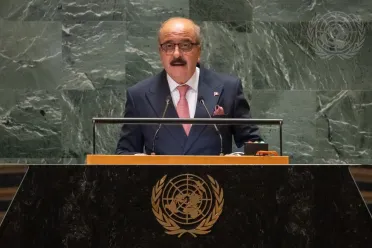Statement
Statement summary
MOHAMED ALI NAFTI, Minister for Foreign Affairs, Migration and Tunisians Abroad of Tunisia, said that while the international community aims to achieve a more peaceful, just and sustainable world, through the 2030 Agenda and other frameworks, the terrible humanitarian tragedy of the Palestinian people continues on their own territory for nearly a year. While they are subjected to the most heinous war crimes perpetrated by the occupying forces, the international community stands silent and fails to enforce international laws. “The only way for a safe future for all is to hold to the belief that there are no double standards,” he said, asking: “How can there be no one left behind if the tragedy of Palestinian people is ignored?” Immediate steps must be taken to end the genocide of the people in Gaza. The Security Council must break its stalemate and hold the occupying authorities responsible and impose an immediate ceasefire.
“The war on Gaza jeopardizes peoples’ trust in the Organization,” he said. The UN must carry out the International Court of Justice’s 19 July advisory ruling, that Israel’s occupation of the Gaza Strip and the West Bank, including East Jerusalem, is unlawful. “This opinion puts the international community to the test to stop double standards,” he said. Tunisia supports the Palestinians right to an independent State and full UN membership. He condemned Israel’s attacks on Lebanon and called on the Council to take a firm stand to stop crimes without delay. “The principle of leaving no one behind cannot be achieved with empty slogans,” he added.
Turning to issues outside the Mideast, he said the economic gap between the Global North and South is widening and the international financial system cannot meet the needs of developing countries. “There must be necessary reviews and reforms to address the challenges,” he said. States and institutions must make joint efforts and respect international law without discrimination. After eight decades, the Organization must review its rules. “Today’s threats cannot be met using the same tools and methods that take into account the needs of only a few States,” he said. Developed countries must support the growth and sustainable development of developing countries. “There must be an end to all forms of interference in countries’ internal affairs. The challenges can only be faced based on rebuilding international rules using mutual respect and equality.” Debt restructuring is needed to let developing countries recover from financial crises they did not create and to focus on meeting the needs of their people.
Turning to the issue of irregular migration, he said this trend is growing in many regions, especially the Mediterranean. “Solutions must be developed by the countries of origin, transit and destination, as well as relevant organizations, to meet the root causes,” he said. “There must be respect for human rights. And a rejection to exploit migrants.” He stressed the importance of reform, democracy and the rule of law to fight corruption and achieve people’s right to sustainable development, as well as women’s inclusion in public life at all levels, including peacekeeping. He supported the Libyan Government and rejected all forms of interference in its internal affairs, and supported efforts to restore peace in Syria and Yemen. He called for “African solutions for African problems.” To meet global challenges, “solidarity and cooperation are necessary. The United Nations is the only hope we have as we prepare to celebrate its eightieth anniversary next year.”
Full statement
Read the full statement, in PDF format.
Photo

Previous sessions
Access the statements from previous sessions.
